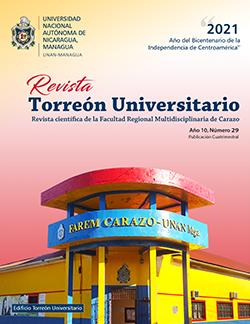Systematization of Educators experience at Cenicsol Therapeutic Community in the treatment of adults addicted to Psychoactive Substances
DOI:
https://doi.org/10.5377/rtu.v10i29.12737Keywords:
Therapeutic Community, educator, psychoactive substance useAbstract
Systematization axis: The experience in the therapeutic community was systematized having as its axis, the reconstruction and critical interpretation of the role of the educator in the treatment of adults with disorders due to the use of psychoactive substances of the Cenicsol residential program. The objective is to develop a critical evaluation of the educator's role in the therapeutic community and in treatment.
Method: The methodology used to systematize experiences of five main moments: the starting point; the initial questions; recovery of the process experienced; the background reflection and finally the arrival points. The instruments applied were the semi-structured interview. The therapeutic director was interviewed; two therapists; three educators and three users from the adult therapeutic community.
Results: The therapeutic community is a drug-free residential environment, it is a highly structured system whose fundamental characteristic is the existence of an artificial pressure system, which obeys the fundamental purpose which is to activate the pathology of the addict in treatment and promote social rehabilitation. The educator is a facilitator of the user's recovery process, coordinates programmed activities of the community and performs therapeutic interventions if necessary. Among the main therapeutic strategies are empathic listening and observation, using cognitive behavioral techniques in individual and group counseling.
Downloads
References
Asociación Americana de Psiquiatría (APA). (2014). Manual diagnóstico y estadístico de los trastornos mentales (DSM 5). Arlington: Editorial Panamericana.
Caballo, V. E., Salazar, I. C. & Carrobles, J. A. (2014) (dirs.) Manual de psicopatología y trastornos psicológicos (2ª ed.). Madrid: Pirámide.
Jara, O. (1998). Para sistematizar experiencias. San José: Editorial ALFORJA.
Jara, O. (2012). La Sistematización de Experiencias, práctica y teoría para otros mundos posibles. Bogotá: CINDE.
National Institute on Drug Abuse (NIDA). (2012). Principles of drug dependence treatment. A Research based Guide. (Third Edition). NIH Publication No. 12–4180.
Oficina de las Naciones Unidas contra la Droga y el Delito (ONUDC). (2017). Normas internacionales para el tratamiento de trastornos por el uso de drogas. Ginebra: ONUDC.
Organización Mundial de la Salud (OMS). (2004). Neurociencia del consumo y dependencia de sustancias psicoactivas. Maryland: OMS.
Published
How to Cite
Issue
Section
License
Copyright (c) 2021 Universidad Nacional Autónoma de Nicaragua, Managua

This work is licensed under a Creative Commons Attribution-NonCommercial-NoDerivatives 4.0 International License.
The authors who publish in this journal agree to the following terms.
- The author or authors of the articles, essays or research grant the National Autonomous University of Nicaragua, Managua (UNAN-Managua) the editing rights (copyright) of the submitted work, therefore the University has the exclusive right to publish the article for the entire copyright period.
- These copyrights/authors authorize Torreón Universitario Magazine and the University to edit and disseminate/publish the article in said Magazine, including printed and electronic reproduction, storage, retrieval and any other type of publication, and sources of secondary information as services. of summaries and databases, they also empower it to protect the article against unauthorized use for dissemination by printed or electronic media (PDF, HTML, EPUB, XML or others).
License for use of content
The magazine uses the Creative Commons Attribution-NonCommercial-NoDerivs 4.0 International License.
Under this statement:

This journal is licensed under a Creative Commons Attribution-NonCommercial-NoDerivatives 4.0 International License. It can be copied, distributed and transmitted publicly as long as the author and source are cited (Revista Torreón Universitario), it should not be modified or used for any commercial purpose. The full license can be found at http://creativecommons.org/licenses/by-nc-nd/4.0/.



